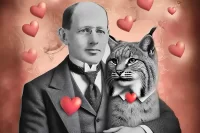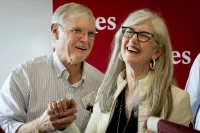
Q&A: Anike Tourse ’92 preps a solo show for Orientation 2016
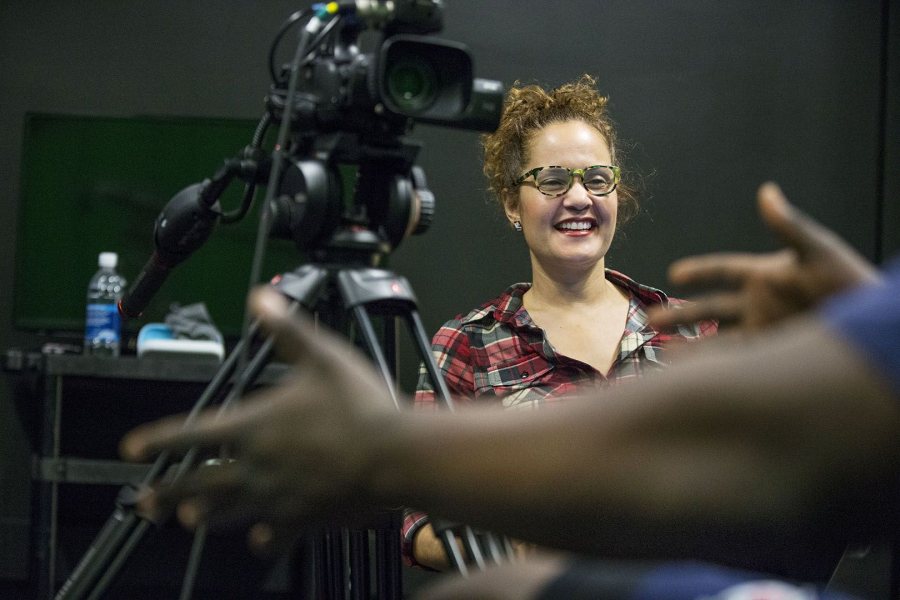
Anike Tourse ’92 reacts during a video interview in the Digital Media Studios on April 25, 2016. (Phyllis Graber Jensen/Bates College)
How do you teach a room full of 500 first-year students who just arrived on campus what it means to be a part of the Bates community?
The answer: Anike Tourse ’92.
As a Bates alumna and a professional solo artist, Tourse is now part of the First-Year Orientation program whose goal, among others, is to give members of the Class of 2020 the tools to discover how to live respectfully, think independently, and learn with integrity at Bates and beyond.
Tourse will return in the fall with a performance celebrating the idea that there is no single Bates experience.
In preparation for a solo performance she will present during First-Year Orientation in August, Tourse visited campus in April to do video and audio interviews with students, faculty, and staff.
Drawing from these interviews and what she already knows about Bates, Tourse will return in the fall with a performance, co-sponsored by the offices of Campus Life and Equity and Diversity, celebrating the idea that there is no single Bates experience, no one way to be a Bates student.
By presenting a variety of composite characters — and relying on the magic of theater — Tourse hopes to communicate the ideals of diversity, inclusion, and thoughtful choice-making so they become tangible feelings among the first-years.
Carrie Murphey ’06, assistant dean of students for first-year programs, says that “it’s incredibly important to engage first-year students on issues of diversity and inclusion in a way that allows them into the conversation.”
Tourse’s show, Murphey says, should accomplish that goal because it will use “strong Bates traditions in the performing arts and storytelling” in helping new students see the possibility for engaging with difference, “both at Bates and beyond.”
For this soon-to-graduate senior, the phrase “Bates and beyond” has only existed as language that fills Bates communications (not unlike the one you’re reading right now).
We both see Bates as the place where we became adults who wanted to make a difference by thinking about difference.
But when I sat down with Tourse to learn more about her project, I understood that as a graduating senior I would soon share Tourse’s connection to the “beyond.”
For a few seconds, that reality seemed daunting.
But by the end of our conversation, I was empowered by the idea that Tourse and I now had something distinctly in common — aside from the vegan bar meal we had both chosen to eat. We both see Bates as the place where we became adults who wanted to make a difference by thinking about difference.
Tourse and Murphey both hope that, four years from now, the Bates Class of 2020 will feel the same way.
Here’s what we talked about.
What have you been hearing from students?
I had forgotten how smart Bates students are; I was taken off guard by their ability to cross-reference when responding to my questions. Even if they aren’t exactly sure about something — they can come up with a frame of reference to tease out what they think, and it’s impressive.
It’s made me think about stepping up my own game in terms of what this presentation is going to be about — to make sure that it hits people on the emotional level and the intellectual level, and make sure it really engages this audience.
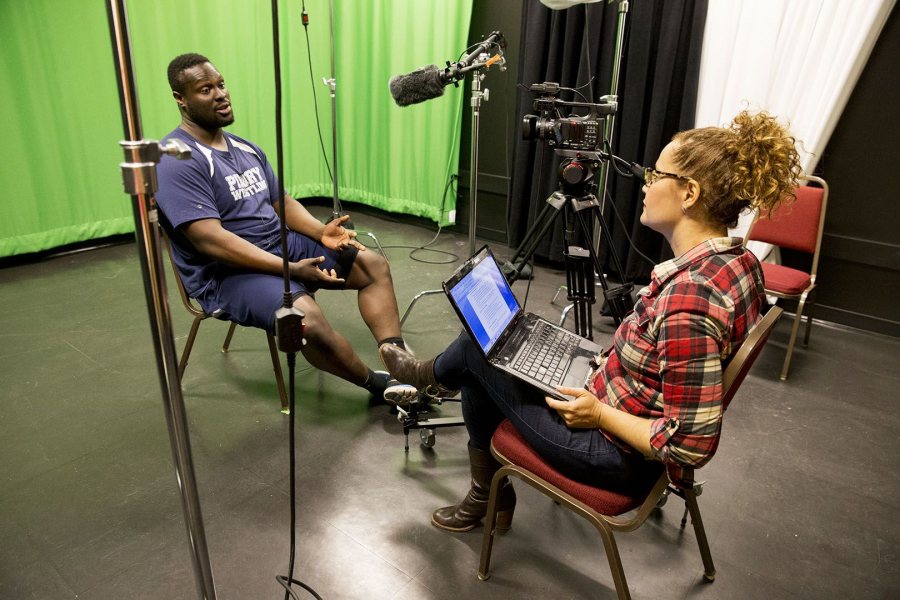
Tourse does a video interview with Adedire Fakorede ’18 of Newark, N.J., at the Digital Media Studios in Pettigrew Hall. (Phyllis Graber Jensen/Bates College)
Among every single person that I interviewed, it’s clear that there’s an overarching commitment to the Bates community. One way or another, they appreciate the value of the friendships that they have here and the connections to professors that they have here.
They also expressed an understanding that everyone here can succeed — that you don’t succeed at the expense of another person at Bates. It’s nice to think that these students will take the notion of a “rising tide lifts all boats” with them when they go into the working world.
What do you hear about issues of diversity and inclusion?
The perspectives really range. I heard one student say, “This is the most diverse place I have ever been in my life,” immediately followed by another student in an interview who said, “There’s no diversity here, and this is really problematic.”
There’s a general feeling, however, even among students who feel there are problems, that the administration wants to be helpful and wants to meet folks where they’re at and see what we can do as a community to address the concerns.
How does it feel to come and do a program at your alma mater?
It’s been challenging and fun to separate my own personal experience at Bates from the “what’s new” at Bates. My parents went to Bates, so I’m sure they have had the same experience. Even today, my father is the best in our family when it comes to adjusting to Bates’ development.
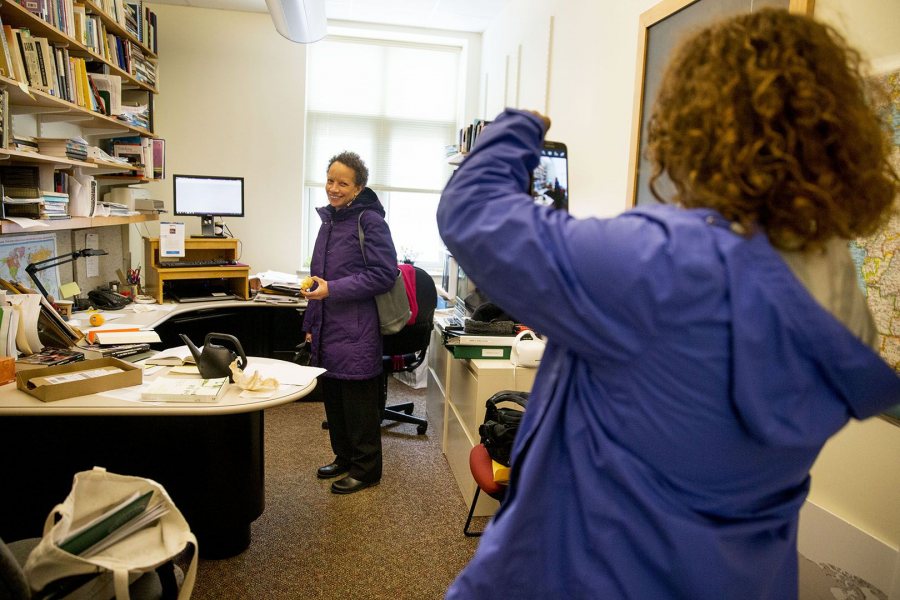
Tourse’s fact-finding visit included doumenting people and their campus spaces. Here, she videos Associate Professor of Politics Leslie Hill in her Pettengill Hall office. (Phyllis Graber Jensen/Bates College)
I sat in on a class in Hedge today, and was so distracted thinking, “What happened? This used to be my dorm!” I wanted to text my old floor mate and friend and say, “Just so you know, your room is now a study room.”
Do you find yourself thinking about what your first-year orientation was like?
I remember one thing very distinctly. We were in the Chapel, and there were two upperclass students telling us some pretty weighty things about social life, how we were expected to make responsible choices for ourselves when we went to parties.
There was a coach or professor sitting with them, but he wasn’t speaking. I was confused. This was the first time I experienced students as facilitators rather than teachers as facilitators.
And while on some level I had a sense that I was being given an open ticket to navigate my way through college, I was also very aware that I had no idea where to begin or how to do that.
Part of what excites me about developing and performing this piece is that if it succeeds, it could be the mouthpiece for other students to explain to the incoming class, in deeper, detailed ways — and in their own voices — the options available to them for finding their own paths at Bates.
You wrote your Sojourner Truth solo show when you were at Bates. That’s awesome.
I wrote it when I was a junior, and I’m still performing it today. I learned how to do that here. Of course, we didn’t have what you have, the Digital Media Studios, where I’ve been doing my video interviews for this project. It’s amazing — oh my god!
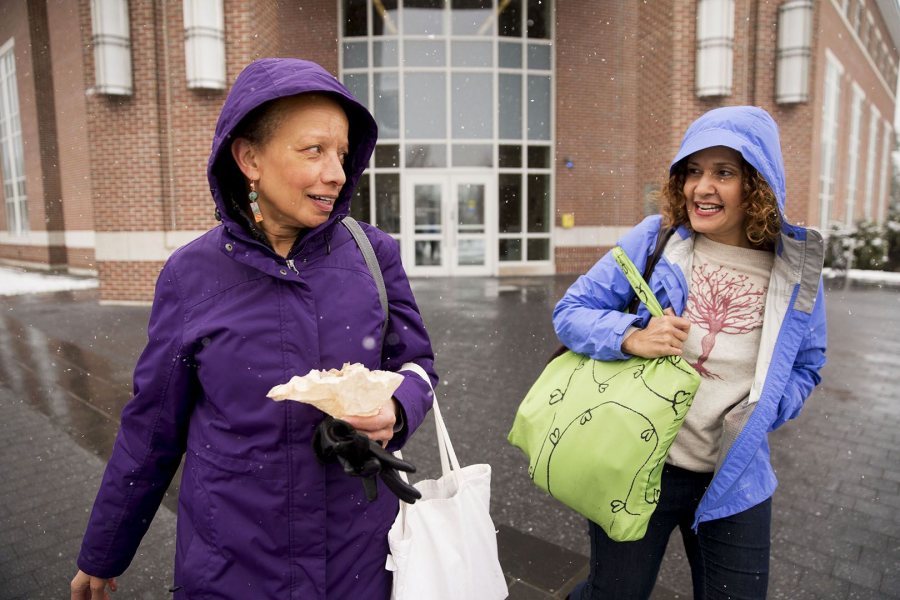
Tourse and Associate Professor of Politics Leslie Hill leave Pettengill Hall for the Den, where the two talked over lunch. (Phyllis Graber Jensen/Bates College)
Bates is so good about believing in ideas. People are like, “That’s cool. You should do that.” And they support you. Nobody says, “What are you talking about? That won’t go anywhere.” No one says that and nobody even thinks that.
At this point, do you have a sense of what the performance will look like?
There is still some contextual reading that I would like to do about where my performance fits, not just here at Bates but along the whole college canon. What is happening here at Bates? What is happening here that’s also happening at Bowdoin, that’s also happening at undergraduate institutions all over the country?
At Orientation, what would you want Bates’ first-year students to take away from the performance?
In an interview yesterday, an international student said that people have asked her questions that she couldn’t imagine anybody asking. Like, “Do you live in a hut?” or “Do you have a lion in your backyard?” or “How have you learned English so fast?”— when, actually, English is the national language of her country.
She said that even though these conversations could get tiring and tedious, at least people are asking the questions and that once people stop asking questions they stop caring. And if you stop caring then you never talk about diversity or inclusion, and that’s how you go on into the world.
Most of the time, I do these solo performance pieces in businesses and in law firms. Some of the problems that students talked about during their interviews at Bates are the same problems that people complain about in the corporate world.
If students can get comfortable talking about these issues here, then they are going to be at a much greater advantage when navigating diversity after Bates in the working world. They have a shot at becoming agents for change in their communities.
Bates, like many institutions across the country, has a ways to grow and develop more in these areas, but they are light years ahead of when I was here. And it’s light years ahead of when my dad was here and when my mom was here.
How does it feel to now be part of the “light-years ahead” phenomenon?
I put up a post on Facebook saying that I was here developing a new performance piece, and how, when I hear the Hathorn bell, I think, “Shoot, I’m late to class!” There were 50 likes after just a few minutes of posting it and everyone was saying, “Oh my god, you’re at Bates, that’s so great.”
When I was here, everyone had an identity. People knew I was an actress, and I think everyone is excited that I’m back here and still doing that. It’s exciting to me, too.
